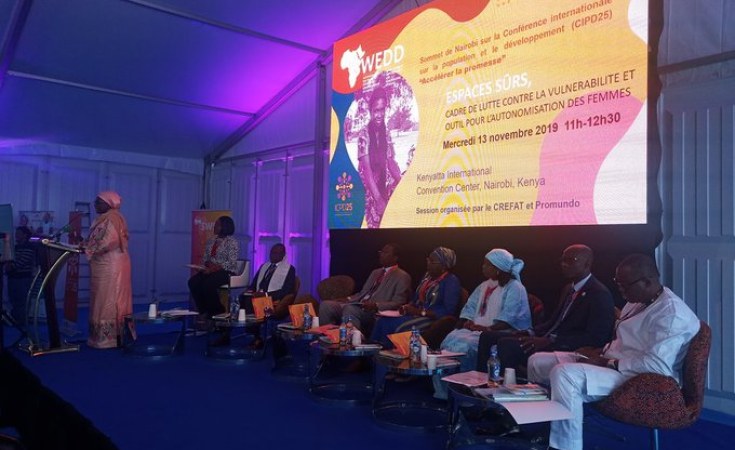Nairobi — After five years of implementation, the Women's Empowerment and Demographic Dividend in the Sahel program is producing satisfactory results. Authorities of the beneficiary countries Benin, Burkina Faso, Mali, Mauritania, Niger, Ivory Coast and Chad, told participants at a session on Demographic Dividend in the Sahel was held on November 13 in Nairobi.
It aims to accelerate the demographic transition, trigger the demographic dividend and reduce gender inequalities in the region, and specifically to increase women's and adolescent girls' access to sexual and reproductive health, including voluntary family planning and maternal health. The Sahel Women's Empowerment and Demographic Dividend Project (SWEDD) also helps to eliminate systemic bottlenecks in health service delivery and help countries develop a political agenda that places demographics and gender at the heart of growth. Representatives from beneficiary countries shared their experience and the actions that have helped more than 106 thousand girls go back to school.
The Regional Steering Committee representative said that SWEDD has shown encouraging results in West and Central Africa, making this region a model. This explains why countries like Benin, Cameroon, Guinea and Senegal have shown interest in the project and negotiations for their integration with the World Bank are at an advance stages.
Mali's Minister of Planning and Population Dr Adama Tiemoko Diarra said that this initiative has done much to reduce drop-out rates. He took the opportunity to emphasize the importance of education in the era of demographic transition. According to him, SWEDD has helped Mali to achieve a gross enrollment rate of 80%, but lamented the fact that enrollment level for girls only stands at 70%. Faced with this state of affairs, he says, support has been provided for girls' schooling through cash transfer systems allocated to families. Sanitary kits and bicycles are given to girls to facilitate transportation to school. He says SWEDD has assisted more than 24 thousand girls in Mali.
The same trend is noted in Mauritania, Minister of Social Affairs, Children and the Family, Dr Nene Oumou Deffa Kane, said as SWEDD support has reduced the dropout rate from 6.7% to 4% between 2016 and 2018. Dr Amadou Aïssata Issa Maiga, Minister of Population of Niger says SWEDD has made a considerable contribution in the fight against early marriages and the setting up of "Safe Spaces" for young girls in Niger.
In the case of Chad, Minister of Economy and Planning and Development Issa Doubragne said that the project on empowering women and the demographic dividend in the Sahel has attracted the attention of traditional and religious leaders as well as the the private sector. He said the project has shown that girls can go to school and stay in school, they can access all types of workand conversation will religious authorities on this important issue is not an impossibility. More than 100 women have been trained to drive heavy equipment and 168 women have been trained in the field of renewable energy.
A Call for More Government Involvement
Doubragne said 10 000 women benefited from the SWEDD project support, 600 girls were supported, improving their health. He said nearly six million people have benefited from activities of SWEDD hence the call for States to show political will in line with the activities of SWEDD to enhance its achievements. This call for action is in line with the one launched by the Director of UNFPA's West and Central Africa Office, M. Mabingué Ngom for accelerating the promises of the ICPD.
In a session with journalists about "scaling up", held prior to the Nairobi conference, Ngom pushed to have SWEDD in all the countries of the region by 2030. Ngom believes that in order to achieve the goals of zero maternal deaths, zero forced marriage, and voluntary family planning and maternal health, States need to act by adopting strategies based on partnership.
The event was organized by the implementing partners of the Sahel Women's Empowerment and Demographic Dividend Project (SWEDD), CREFAT-CREG, and Promundo US. It receives financial support from the World Bank, technical support of the United Nations Population Fund (UNPFA) and the West African Organization for Health (WAHO).
SWEDD is a multisectoral and multidimensional partnership between seven Sahelian countries. Launched in November 2015, the SWEDD project is funded by the World Bank, coordinated by UNFPA with technical assistance from the West African Health Organization. This initiative responds to the call made by the presidents of the Sahel countries. It works to accelerate the demographic transition, trigger the demographic dividend and reduce gender inequalities in the region, and specifically to increase women's and adolescent girls' access to sexual and reproductive health, including voluntary family planning and maternal health. The SWEDD project also helps to eliminate systemic bottlenecks in health service delivery and help countries develop a political agenda that places demographics and gender at the heart of growth.
Read the original report by Bacary Dabo on https://fr.allafrica.com/


